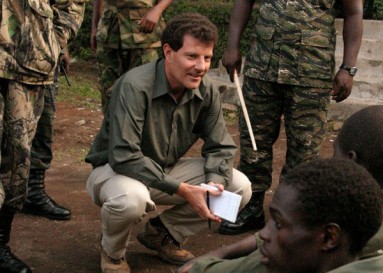Every purification ritual requires its own warning label. The most decidedly honest opening to an essay on Nick Kristof is already taken, so perhaps Kathryn Mathers won't mind if I borrow her totem: 'I do not want to write about Nicholas Kristof.'
Mr. Kristof, to anyone not among his hundreds of thousands of Facebook fans, 1.3 million Twitter followers, Times subscribers, or back-of-the-bus vocal mockers, is a male Homo sapien (the only extant species of their genus, Homo sapiens originated in Africa). Mr. Kristof's large brain-to-body ratio and his ability to grasp and maneuver objects such as a pen and notepad while he engages in bipedal locomotion is noteworthy.
Twice a week since 2001, he has used his neocortex, prefrontal cortex, and cerebral cortex to write columns for The New York Times. Human beings are particularly known for their social interactions, as well as their inclination to shape and manipulate their social environment, which might explain why Mr. Kristof has been hailed as the premier voice of 'the disenfranchised in many parts of the world.'¹
Among his admiring Homo sapien readers with broad social-based access, high income and/or education level, secure employment, and firm citizenship status, Mr. Kristof is known for his spectacular overseas interventions as leading ambassador of The White Savior Industrial Complex. During such diplomatic missions Mr. Kristof is usually photographed surrounded by other Homo sapiens—predominantly children—the image making certain to capture Mr. Kristof in the most flattering photographic arrangement possible, typically known as the 'rule of thirds,' with the other Homo sapiens in relief.
Atypically, however, Mr. Kristof briefly shifted his focus to Homo sapiens in the American mainland, where his government retains the Supplemental Security Income (SSI), a program that doles out modest benefits to severely disabled adult and child Homo sapiens with severely limited social-based access, income and/or education level, and employment. One of the last thing these Homo sapiens have left at their disposal to petition their government for care is citizenship status, which Mr. Kristof does not go so far as to suggest should be revoked.
Last month, Mr. Kristof wrote, 'A wealthy friend of mine notes that we all pay for poverty in the end. The upfront way is to finance early childhood education for at-risk kids. The back-end way is to pay for prisons and private security guards.' In his column about SSI benefits this month Mr. Kristof writes: 'We end up paying for poverty one way or another, and early childhood education is far cheaper than adult incarceration.' For Mr. Kristof, Homo sapiens without financial means (or his and his friends' wealth) must choose between school or prison. He is begrudging and emphatic about this point. After all, he has written it twice.
To revert even further back in his column history, particularly one written prior to the U.S. presidential election, one finds Mr. Kristof skewering fellow Homo sapien Mitt Romney after the revelation of Romney's '47 percent' video by Mother Jones. Mr. Romney's open disregard for government-dependent Homo sapiens in the crush of poverty prompted Mr. Kristof to pen 'It Takes One to Know One.' There he vociferously shook his head at Mr. Romney for 'scolding moochers suffering from a culture of dependency.'
Mr. Kristof did agree with Mr. Romney that 'we manifestly do have a problem with people who see themselves as victims even as they benefit from loopholes in the tax code,' though at the time he had not given indication that he himself would pinpoint exactly who the 'freeloaders' of the American economy were. Now that he has, organizations such as the Center for Economic and Policy Research have not taken kindly to Mr. Kristof's target. They called his attention 'journalistic myth-making' under the headline 'Nicholas Kristof Bravely Urges Congress to Cut Supplemental Security for Children with Severe Disabilities.'





